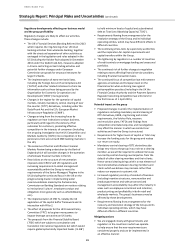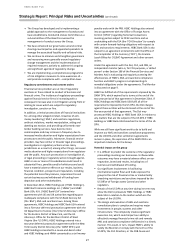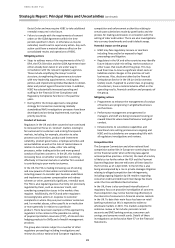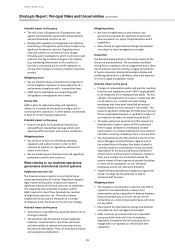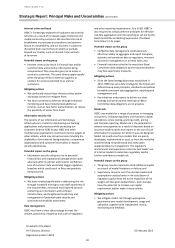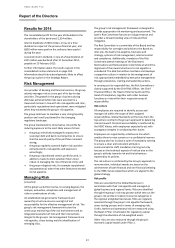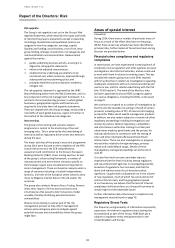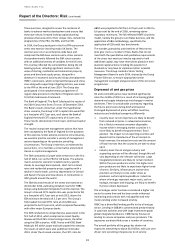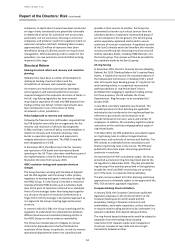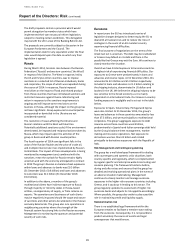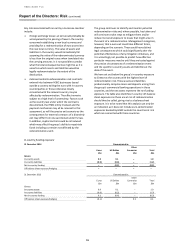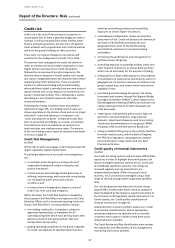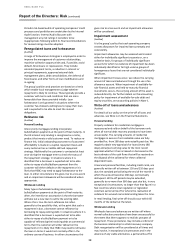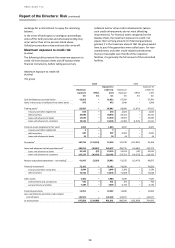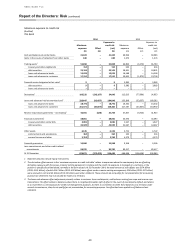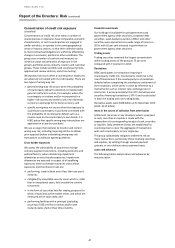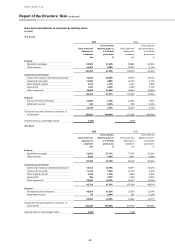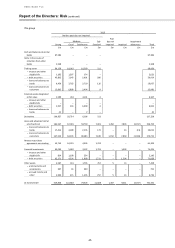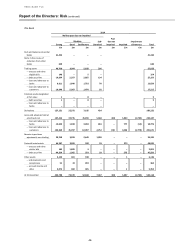HSBC 2014 Annual Report Download - page 38
Download and view the complete annual report
Please find page 38 of the 2014 HSBC annual report below. You can navigate through the pages in the report by either clicking on the pages listed below, or by using the keyword search tool below to find specific information within the annual report.
HSBC BANK PLC
Report of the Directors: Risk (continued)
36
Key risks associated with an exit by a Eurozone member
include:
• Foreign exchange losses: an exit would probably be
accompanied by the passing of laws in the country
concerned establishing a new local currency and
providing for a redenomination of euro assets into
the new local currency. The value of assets and
liabilities in the country would immediately fall
assuming the value of the redenominated currency
is less than the original euros when translated into
the carrying amounts. It is not possible to predict
what the total consequential loss might be as it is
uncertain which assets and liabilities would be
legally redenominated or the extent of the
devaluation.
• External contracts redenomination risk: contracts
entered into between HSBC businesses based
outside a country exiting the euro with in-country
counterparties or those otherwise closely
connected with the relevant country may be
affected by redenomination. The effect remains
subject to a high level of uncertainty. Factors such
as the country law under which the contract is
documented, the HSBC entity involved and the
payment mechanism may all be relevant to this
assessment, as will the precise exit scenario as the
consequences for external contracts of a disorderly
exit may differ from one sanctioned under EU law.
In addition, capital controls could be introduced
which may affect the group’s ability to repatriate
funds including currencies not affected by the
redenomination event.
The group continues to identify and monitor potential
redenomination risks and, where possible, has taken and
will continue to take steps to mitigate them and/or
reduce its overall exposure to losses that might arise in
the event of a redenomination. Management recognises,
however, that a euro exit could take different forms,
depending on the scenario. These could have distinct
legal consequences which could significantly alter the
potential effectiveness of any mitigation initiatives, and
it is accordingly not possible to predict how effective
particular measures may be until they are tested against
the precise circumstances of a redenomination event
and the specific in-country assets and liabilities at the
date of the event.
We have set out below the group’s in-country exposure
to Greece as the country with the highest level of
redenomination risk. These assets and liabilities
predominantly comprise loans and deposits arising from
the group’s commercial banking operations in these
countries, and the net assets represent the net funding
exposure. The table also identifies in-country off-balance
sheet exposures as these are at risk of redenomination
should they be called, giving rise to a balance sheet
exposure. It is to be noted that this analysis can only be
an indication as it does not include euro-denominated
exposures booked by HSBC outside the countries at risk
which are connected with those countries.
In-country funding exposure
31 December 2014
Denominated in:
Euros
US Dollars
Other
Currencies
Total
£bn
£bn
£bn
£bn
Greece
In-country assets
0.9
0.1
–
1.0
In-country liabilities
(0.9)
(0.3)
–
(1.2)
Net in-country funding
–
(0.2)
–
(0.2)
Off balance sheet exposure/hedging
–
–
–
–
31 December 2013
Denominated in:
Euros
US Dollars
Other
Currencies
Total
£bn
£bn
£bn
£bn
Greece
In-country assets
0.9
0.1
–
1.0
In-country liabilities
(0.8)
(0.5)
–
(1.3)
Net in-country funding
0.1
(0.4)
–
(0.3)
Off balance sheet exposure/hedging
(0.1)
–
0.2
0.1


